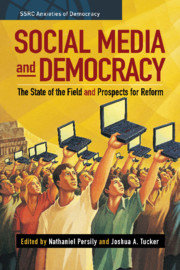Pablo Barberá is Associate Professor of Political Science and International Relations at the University of Southern California and a research scientist at Facebook.
Adam J. Berinsky is the Mitsui Professor of Political Science at Massachusetts Institute of Technology (MIT) and Director of the MIT Political Experiments Research Lab.
Richard Fletcher is a senior research fellow and research team leader at the Reuters Institute for the Study of Journalism at the University of Oxford.
Erika Franklin Fowler is Associate Professor of Government at Wesleyan University and Co-Director of the Wesleyan Media Project.
Michael M. Franz is Professor of Government and Legal Studies at Bowdoin College and Co-Director of the Wesleyan Media Project.
Francis Fukuyama is the Olivier Nomellini Senior Fellow at the Freeman Spogli Institute for International Studies and the Mosbacher Director of the Center on Democracy, Development, and the Rule of Law at Stanford University.
Timothy Garton Ash is the Isaiah Berlin Professorial Fellow at St. Antony’s College at the University of Oxford, Professor of European Studies at the University of Oxford, and Senior Fellow at the Hoover Institution at Stanford University.
Robert Gorwa is a doctoral student in the Department of Politics and International Relations at the University of Oxford.
Andrew Grotto is the William J. Perry International Security Fellow at the Center for International Security and Cooperation, Research Fellow at the Hoover Institution, and Director of the Program on Geopolitics, Technology, and Governance at the Stanford Cyber Policy Center.
Andrew M. Guess is Assistant Professor of Politics and Public Affairs at Princeton University.
Tim Hwang is a research fellow at the Center for Security and Emerging Technology at Georgetown University.
Daphne Keller is Director of the Program on Platform Regulation at the Stanford Cyber Policy Center.
Rasmus Kleis Nielsen is Director of the Reuters Institute for the Study of Journalism and Professor of Political Communication at the University of Oxford.
Paddy Leerssen is a PhD candidate at the University of Amsterdam.
Benjamin A. Lyons is Assistant Professor of Communication at the University of Utah.
Nathaniel Persily is the James B. McClatchy Professor of Law at Stanford Law School and the Faculty Co-Director of the Stanford Cyber Policy Center.
Travis N. Ridout is the Thomas S. Foley Distinguished Professor of Government and Public Policy in the School of Politics, Philosophy and Public Affairs at Washington State University and Co-Director of the Wesleyan Media Project.
Alexandra A. Siegel is Assistant Professor of Political Science at the University of Colorado Boulder.
Joshua A. Tucker is Professor of Politics, affiliated Professor of Russian and Slavic Studies, and affiliated Professor of Data Science at New York University.
Chloe Wittenberg is a doctoral student in the Department of Political Science at Massachusetts Institute of Technology.
Samuel C. Woolley is Assistant Professor at the School of Journalism at the University of Texas at Austin.

